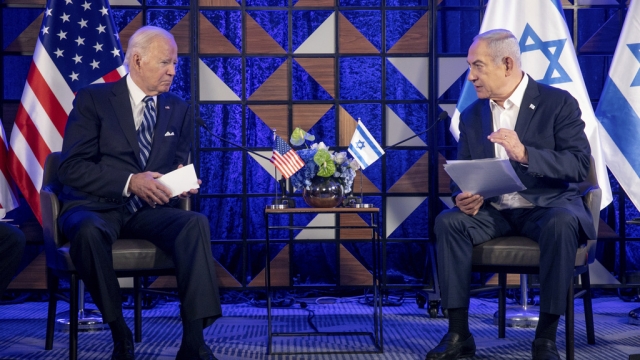On a high-stakes trip to Israel, President Joe Biden walked a geopolitical tightrope as he reinforced America's strong support for the Jewish state while working to keep the conflict with Hamas from escalating. One of the biggest priorities of the trip was facilitating the movement of humanitarian aid to Palestinian civilians in Gaza, an agreement some experts say still faces risks.
In the immediate aftermath of Hamas' surprise attack on Israel, President Biden publicly declared that Israel has the right to defend itself, and that the U.S. would stand with it in the fight against terrorism.
"In this moment, we must be crystal clear: We stand with Israel. We stand with Israel. And we will make sure Israel has what it needs to take care of its citizens, defend itself and respond to this attack," the president said in a speech at the White House on Oct. 10.
In the days that followed, the Biden administration, behind the scenes, ramped up a flurry of diplomatic engagements to aid Israel and facilitate humanitarian assistance to civilians in Gaza.
"The Biden administration is clearly virtue signaling in a way. But there's no reason to doubt that it also is trying to do what it can to reduce the misery, even while supporting Israel's military and strategic objectives," said Michael Barnett, a professor of international affairs at George Washington University.
Shortly after the attacks, Israel blocked food and water into Gaza, while officials in nearby Egypt expressed an unwillingness to take in Palestinian refugees.
"I know the United States has a problem on its southern border that it restricts the entry of those who seek it. So, I wonder why Egypt would allow for the influx of 1 million or 2 million inhabitants who are suffering because of the consequences of being targeted unnecessarily," Egypt's Foreign Minister Sameh Shoukry said in an interview with CNN.
SEE MORE: Gaza airstrikes continue as Israel prepares for a ground invasion
President Biden held regular calls with Israel's prime minister and Egypt's president, while Secretary of State Antony Blinken traveled to neighboring countries seeking to broker a deal for aid.
All the while, the administration was projecting steadfast commitment to Israel's right to defend itself.
"We're in constant communication with Israeli officials and with multilateral international organizations, humanitarian organizations, including the United Nations agencies, including the ICRC, to get aid to civilians in Gaza," Blinken said during a visit to Qatar, adding, "Israel has the right, indeed it has the obligation, to defend its people and to try to ensure that Hamas can never repeat what it's done."
Yet, President Biden says he stressed in his conversations with Israel Prime Minister Benjamin Netanyahu the importance of following the "rules of war" as the conflict continues.
Speaking at a roundtable with Jewish community leaders at the White House on Oct. 11, President Biden described his close relationship with Israel's prime minister and their frequent conversations.
"The one thing that I did say that it is really important, that Israel, with all the anger and frustration and just — I don't know how to explain it — that exists, is that they operate by the rules of war — the rules of war," he said.
The discussions culminated during President Biden's trip to Israel this week, where he said he had "blunt" conversations with leaders about the need for humanitarian aid in Gaza.
"I was very blunt about the need to support getting humanitarian aid to Gaza — get it to Gaza and do it quickly," the president told reporters on Air Force One.
SEE MORE: Biden vows support for Israel, Ukraine in Oval Office address
In Israel, the president announced an agreement with Israel and Egypt to allow a limited number of trucks carrying food, water and other supplies to travel from Egypt into southern Gaza. But he stressed that the aid would cease should Hamas interfere.
"Let me be clear. If Hamas diverts or steals the assistance, it will have demonstrated once again that they have no concern for the welfare of the Palestinian people. And it will end, as a practical matter, I will stop the international community from being able to provide this aid," President Biden said.
Experts like Barnett say it's almost certain that Hamas will obtain at least some of the aid.
"I think it's almost impossible to expect that some aid is not going to fall into the hands of Hamas. It happens in every war," he said.
Meanwhile, the U.S. on Wednesday vetoed a United Nations Security Council resolution calling for a stop to the fighting to facilitate the delivery of aid to civilians. The U.S. representative to the U.N. said the resolution did not make clear Israel's right to defend its people.
Ambassador Linda Thomas-Greenfield, the U.S.'s permanent representative to the U.N., said the resolution "makes no mention of Israel's rights of self-defense. Like every nation in the world, Israel has the inherent right of self-defense, as reflected in article 51 of the U.N. Charter. Following previous terrorist attacks by groups such as Al Qaeda and ISIS, this Council reaffirmed that right. This text should have done the same."
Trending stories at Scrippsnews.com




